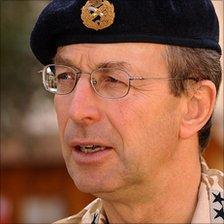Profile: General Sir David Richards
- Published

Gen Richards describes himself as a "seat of the pants" soldier
Gen Sir David Richards is currently the head of the Army and will become Britain's most senior military figure this October. He was previously the Nato commander in Kabul between 2006-7.
Many people expect him to ensure sustaining Britain's commitment in Afghanistan remains the top defence priority, while also trying to better align the political and military aspects of the campaign.
In a recent speech at the International Institute of Strategic Studies, he insisted: "Success in Afghanistan is necessary for our future. Not because of its position or resources, although our campaign there must be placed in a wider and longer-term geo-strategic context, but because of the global consequences of our success or failure."
Gen Richards, 58, who once said Afghanistan and its people, "have entered my bloodstream," warned earlier this year that the armed forces were heading for a "horse and tank moment".
He called for versatile and flexible infantry "boots on the ground" to be preserved, along with greater intelligence gathering capability, at the expense of costly heavy Cold War-era equipment to enable British forces to successfully conduct 21st Century warfare.
Seen as highly political and dynamic, Gen Richards is not afraid of provoking debate about the future role and capability of Britain's armed forces.
In the past he has urged a "fundamental re-think" for the armed forces, warning: "We cannot go back to the fighting that we might have done 10 years ago when it was still tanks, fast jets, fleet escorts that dominated the doctrine of the three services.
"Too often, we still strive for a hugely expensive, 100% solution or exquisite solution for some state-on-state war that risks being out of date before it comes into service."
'Widely respected'
Gen Richards is one of the UK's most experienced military figures in terms of operational command. He saw service in the Far East and Germany, and commanded in East Timor and Sierra Leone, as well as completing three tours of Northern Ireland.
He made his name in 2002 as commander of a British-led force which was sent to evacuate Britons and other foreigners from Sierra Leone during a violent civil war. He went beyond his mandate to successfully take on the rebels in what became seen as a textbook campaign.
Describing himself as "a seat-of-the-pants soldier," Gen Richards is widely respected by soldiers, journalists, aid workers and others as an excellent communicator, as well as a risk-taker.
He is expected by many people to give David Cameron and the rest of the government blunt and honest military advice - even if it includes advice they may prefer not to hear.
However, he will come to the post at a tough time for defence and for the mission in Afghanistan. The Ministry of Defence will not be protected from far-reaching cuts, which could even see the size of the British army slashed by almost 25%, bringing its fighting strength down from around 100,000 to just 75,000.
All three services are expected to suffer, with the Treasury suggesting current defence expenditure must be cut by a third of its present level within three years.
Dealing with those deep cuts - while ensuring that Britain's armed forces remain world-class - will be one of the first challenges the new Chief of the Defence Staff will have to face.
Gen Richards already has wide support within the Army for his clear articulation of the current strategic choices facing allied forces in Afghanistan and elsewhere.
He believes that the counter-insurgency campaigns in Iraq and now in Afghanistan and the emerging threat of cyber-attacks against Britain's infrastructure make radical change unavoidable, and that opponents of change underestimate the way in which Iraqi insurgents and the Taliban have rewritten the rules of war.
- Published14 July 2010